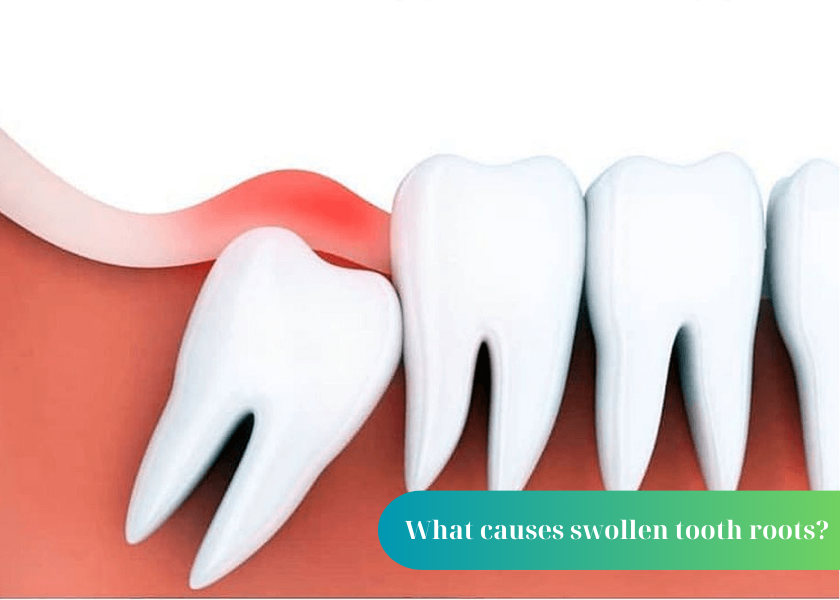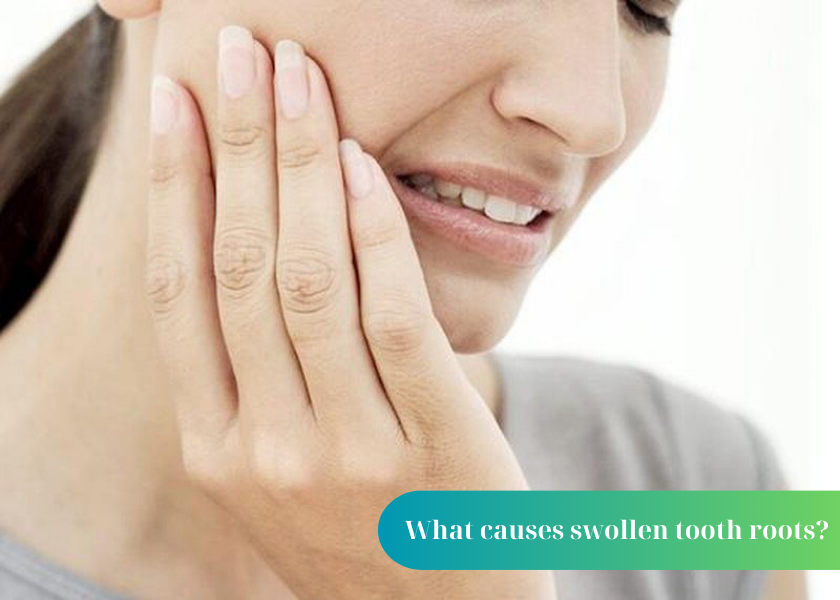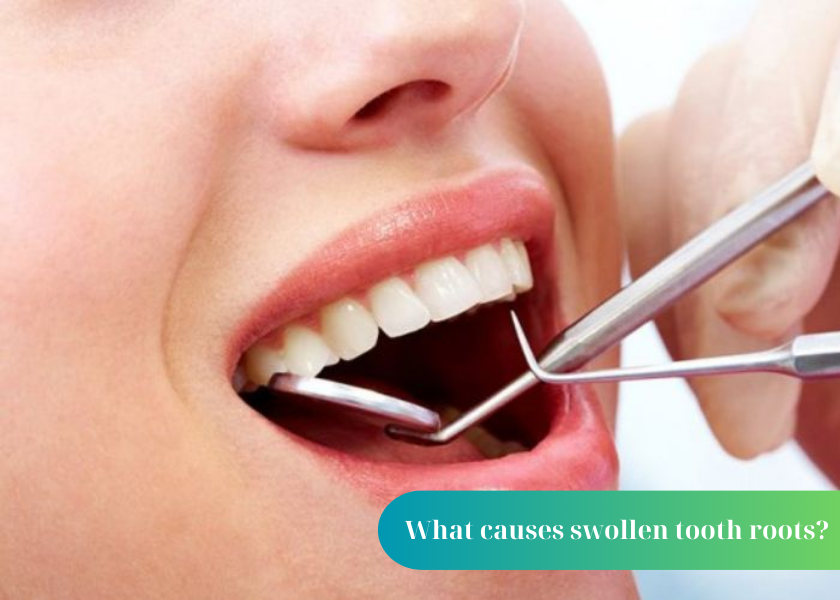What causes swollen tooth roots? Swollen tooth roots are a sign of many diseases that affect the structures around the tooth roots such as gum tissue, gums and the nerve system. In the long term, this condition not only harms eating and chewing but also weakens teeth and, more seriously, causes teeth to die.
Tư vấn chuyên môn bài viết:
BÁC SĨ DƯƠNG THỊ THÙY NGA
What causes swollen tooth roots?

Gums, also known as gums, are a type of tissue that surrounds the tooth root, whose main function is to soften and nourish the tooth root. Gums are a group of tissues that are often inflamed, located in the lower or upper jaw. Therefore, swollen tooth roots can be a sign of pulpitis or gingivitis.
Swelling of the gum line (top and bottom) can happen at any age, but it is most common in teenagers. If diagnosed with moderate or mild severity, the disease will improve quickly. Toothache is the most typical initial sign, then the gums swell and the tooth gradually secretes pus when touched. If the disease becomes more advanced, it will cause difficulty in opening the mouth, affecting learning and daily activities.
Is swollen tooth root dangerous?
Swollen tooth roots, if not treated early, will cause serious consequences. The above disease has been directly threatening the lives of many people.
First, weakened tooth roots will cause difficulty in eating and chewing, and over time will damage the jawbone, gums and tooth roots.
Swollen tooth roots are a similar condition to gingivitis, this is the early stage of the disease. If your resistance is low it will cause more harm. Inflamed gums are a favorable place for bacteria to penetrate and spread easily. It will cause injuries in the mouth area that can be harmful to your health.
See more: Should I get dental implants or dental dentures? – Advantages and disadvantages of each method
Signs that suggest gingivitis and swelling require a visit to the doctor
With mild tooth root swelling, you don’t have to worry because they will usually go away after a few days. However, if the pain persists along with the following symptoms, it is mandatory to go to a dentist for treatment:
- Inflammation and tooth pain will cause the gum area to become red, stiff, burned, or irritated by foods and drinks.
- Gingivitis appears when there is mild impact by brushing teeth or using dental floss.
- The tooth crown looks elongated and the gums appear to slip easily.
- The gums of the tooth do not separate from the tooth crown and form a false pocket at the tooth root to contain the pus.
- Fluid secretion appears in gums and teeth.
- The mouth has a characteristic fishy odor.
- Bad taste in mouth occurs irregularly.
What causes swollen tooth roots – causes and treatments
To treat gingivitis effectively, you need to know clearly the cause of the above phenomenon. Because swollen gums are a disease caused by too many influencing factors. Specifically, the causes of painful swelling and gingivitis include:
Wisdom teeth growing

Swollen molar roots are a symptom most often seen when wisdom teeth are removed. Swelling may appear for a few days but can also last much longer if the wisdom tooth is not in the correct position in the jaw. You are susceptible to lower wisdom teeth growing faster than upper wisdom teeth. There are a number of reasons why the roots of the upper teeth are swollen, among which you should pay attention to the following reasons:
- Wisdom teeth are the first teeth to emerge on the adult jaw, while the other teeth have developed and are in a stable position. Wisdom teeth have to compete for space when the jaw is narrow and there is no room.
- The size of the wisdom teeth is very large but the remaining area on the jaw is too small, so the wisdom teeth cannot erupt any higher and grow hidden under the gums, causing gum inflammation.
- When infected, the gums also swell even more. Inflammation will occur when food remains in the space between the wisdom teeth and gums if not cleaned carefully. This will create a favorable environment for bacteria to easily grow and develop and cause inflammation.
- The gums of the lower teeth become irritated when the upper teeth touch the gums of the lower wisdom teeth or when eating and drinking.
See more: Where to get dental implants in HCMC?
Injury to the gum area appears
Because the molars are responsible for the main function of swallowing and chewing food thoroughly. Therefore, in the process of eating, it will be difficult to avoid sometimes carelessly chewing food vigorously, causing damage to the teeth and gums.
At this time, the strongly stimulated gums will become much more sensitive. In addition, trauma caused by excessive biting force and repeated chewing of hard foods causes tooth ulcers to become even more severe. There are even many cases of trauma causing extremely serious pain in the dental arch and tooth root.
Tooth decay
Gingivitis irritates the gum area, causing the gums to easily swell. Initially, the symptoms of the disease are often overlooked and do not require early treatment.
Only when gingivitis becomes worse, causes pain and even pus, do people seek treatment. However, at first treatment will be very difficult, and more serious cases can easily occur such as ulcers and even tooth loss.
Gum infection often occurs when bacteria or plaque accumulates food in the area at the base of the front teeth. Over time, these plaques can form tartar, making it more difficult to clean with normal oral care.
How to treat swollen gums at home
In cases of moderate gum swelling, you can also apply some pain relief, anti-swelling and anti-inflammatory measures at home. Specifically, the process of care and support for treating swollen, painful gums is as follows:
Reduce local pain and swelling
In case of swollen tooth roots, you should apply cooling measures to minimize the pain caused by inflammation. However, when using this method, you need to pay attention to:
- Do not use ice directly on your face.
- Put ice on a soft, dry cotton pad.
- Do not apply ice for too long. It’s best to do it for about 20 minutes and then rest. You can then continue with the ice treatment.
- In addition to using ice to reduce swelling, you can also refer to some forms of painkillers. However, using painkillers is only recommended when the inflammation and pain are at a level where the body cannot tolerate it anymore. In addition, the correct use of anti-inflammatory and pain-relieving drugs requires professional advice from an experienced doctor.
See more: How Long Does Dental Implant Take? Dental Implant Technique Using Medical Standard 2024
Folk tips to reduce swelling and pain of tooth roots
People with periodontitis should mix a sufficient amount of salt with hot water and then gargle 3 times a day and pay attention that the water is not boiling and not too cold. Lemon juice has a bacteriostatic effect that reduces inflammation very well, so it is considered an extremely effective way to treat inflammation and toothache.
Additionally, when combining salt water with lemon, you can squeeze the lemon into juice and then add a little salt. Then, use the above mixture to apply to your teeth for a few minutes and rinse your mouth with cool clean water. However, lemon has acidic properties if you use the above method, so you must be careful to only apply it to the roots of your teeth, not to the crown of the tooth as it will cause sensitivity and damage the enamel.
Garlic is a folk remedy that helps relieve pain and treat dental diseases, including periodontitis, extremely effectively because it has antibiotic properties that help kill bacteria.
One way to apply natural ingredients at home to help treat periodontitis is aloe vera or aloe vera. Aloe vera contains soothing substances, so use the oily essence extracted from aloe vera to apply to the painful area of inflamed teeth. Within a few days of applying the above method, your teeth will quickly get rid of inflammation and restore health.
About oral hygiene
Swollen and painful tooth roots are often caused by inflammation and infection. Therefore, when you experience numbness and pain, you should take care of your teeth carefully. Specifically:
- Brush your teeth at least twice a day. It is best to brush your teeth after every meal to remove stubborn plaque.
- Toothbrushes should be purchased with fine bristles. In addition, you should remember to replace it every 3 months to prevent bacteria from gradually accumulating.
- When brushing your teeth, you should do it vertically. If you don’t brush horizontally, it will cause more serious tooth damage.
- Combining dental floss helps brush tooth roots best.
- Create clean habits by using saline to rinse your mouth or use a cotton swab.
About daily diet
A suitable diet will promote the process of making the tooth roots healthy again and free of inflammation. Therefore, when you have periodontitis, you should eat the following food groups:
- Vegetables and fruits are rich in fiber: this type of food stimulates the salivary glands to work better, contributing to healthy oral hygiene. Besides, the vitamin content from food and minerals will help remove plaque and care for gums most effectively.
- Foods rich in lactic acid: Lactic acid will help gingivitis quickly improve.
- Adding onions and garlic to your daily nutritional menu helps reduce inflammation and kill bacteria.
- To treat tooth inflammation, you can drink honey and lemon every day. Besides, you should drink it with chrysanthemum tea.
See more: Find out what to do after tooth extraction? 9 things to note after tooth extraction
Dental treatment of swollen tooth roots

If the inflammation of the upper jaw persists and is accompanied by symptoms related to eating and causing pain in the wisdom teeth, specific dental intervention is needed. Coming to the dental clinic, depending on each specific case, you will be instructed on a regimen to reduce swelling of the root of the tooth when removing wisdom teeth:
- Remove undigested food and plaque around developing wisdom teeth to treat swollen wisdom tooth roots.
- Using antibiotics, anti-inflammatories and pain relievers helps minimize complications.
- Removal of gingivitis and gingivitis: In cases of tooth pain or wisdom teeth located in the same row as the remaining teeth, the doctor will perform minor surgery to remove swollen, inflamed tissues to help the teeth erupt easily. easy.
- Removing ingrown or horizontal wisdom teeth: Removing the gums is not a complete cure for gingivitis, so the only way to avoid complications is to remove the wisdom teeth.
An effective way to prevent swollen gums
To prevent periodontitis, you need to pay attention to:
- Pay special attention to comprehensive oral care through: brushing teeth twice a day, using dental floss, sucking on cotton swabs, and rinsing your mouth with physiological saline.
- Regularly visit a dentist for health check-ups and periodic dental cleanings at least once every 6 months. In case of gum disease, you will need to be monitored more closely by your doctor to avoid gingivitis and bleeding gums from continuing.
- Do not arbitrarily use tooth whitening cream or gum treatment medicine without a doctor’s diagnosis.
- Quit smoking and avoid alcohol and stimulating drinks
- Build a balanced, nutritious menu. Pay special attention to supplementing vitamins C, K and calcium to help strengthen bones.
The above article has helped you answer the question: “What causes swollen tooth roots?“. Contact Bedental if you want advice on appropriate methods to care for tooth decay in children, we will provide free help 24/7.
BEDENTAL - TOP STANDARD DENTISTRY SYSTEM
In HANOI
Address 1: 7B Thi Sach St, Ngo Thi Nham, Hai Ba Trung Dist, Ha Noi. - 0934.61.9090
Address 2: 343 Tay Son St, Nga Tu So Ward, Dong Da Dist, Ha Noi. (Nga Tu So Cross) - 0934.61.9090
Address 3: CC2 Tower Nguyen Huu Tho St, Dinh Cong Ward, Hoang Mai Dist, Ha Noi. (Inside True Hope ) - 0934.61.9090
In HO CHI MINH
Address 1: 53 -55 -57 Pho Duc Chinh St, Nguyen Thai Binh, Dist. 1, Ho Chi Minh. - 0766.00.8080
Address2: 25, City Land urban area, Go Vap Dist, Ho Chi Minh - 0766.00.8080
Working: 9am - 6pm everyday
Website: https://bedental.vn/en/


